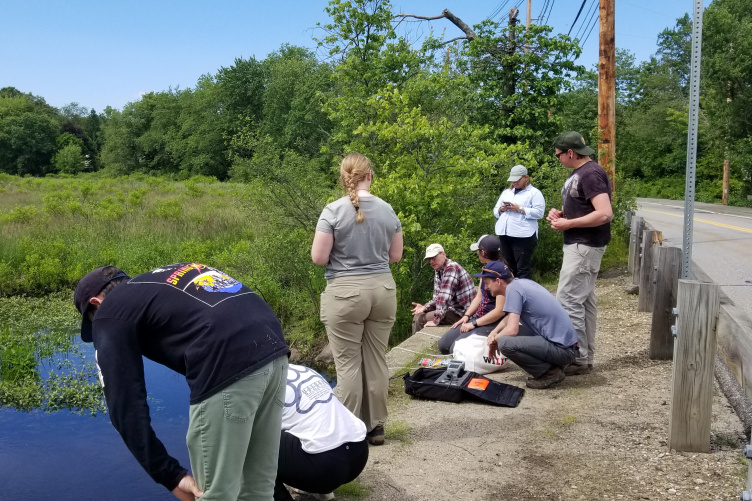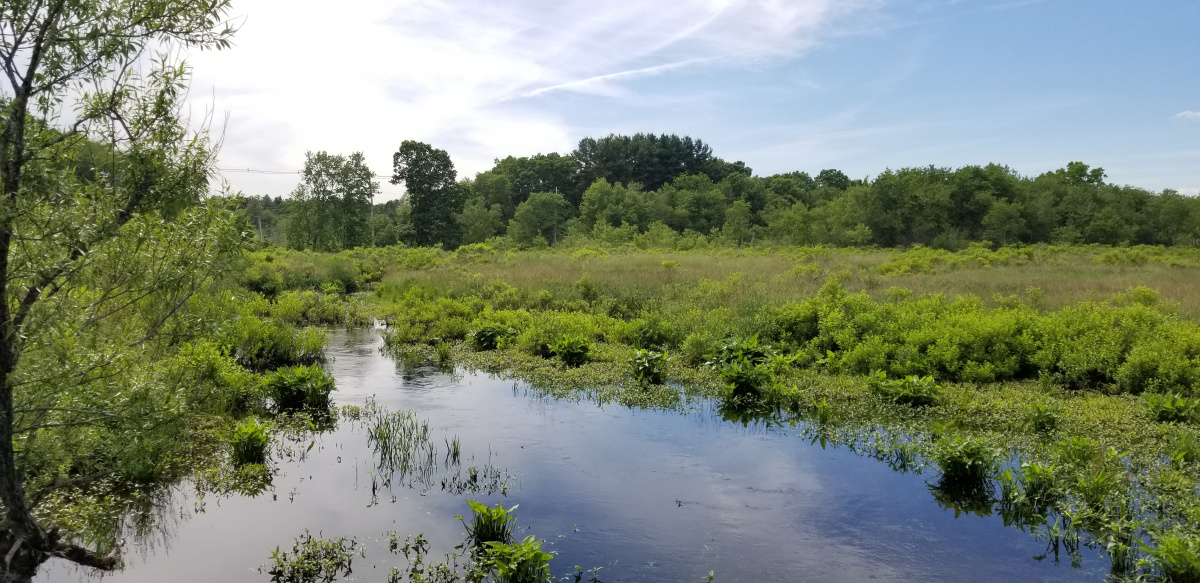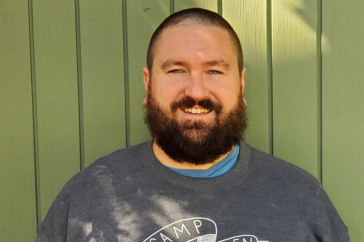
Members of the UNH community learn about Paige Clarizia's sampling process at a few of her sites, including Ruth Varner (advisor/committee member), Wilfred Wollheim (committee member), Paige Clarizia, Chris Whitney and Drew Robison (PhD students of W. Wollheim), and Cindy Bova and Carter Snow (undergraduate SURF recipients), all of whom work on the Ipswich River Watershed.
Paige Clarizia, a graduate student in UNH’s department of Earth sciences and recipient of UNH’s Summer Teaching Award Fellowship, is spending her summer collecting data on greenhouse gas emissions from the Ipswich watershed in Massachusetts.
Each week, Clarizia visits six sites along the watershed, ranging from upstream headwaters to the outlet of a fluvial wetland, to measure methane and carbon dioxide emissions.
“Aquatic ecosystems are major sources of greenhouse gas emissions (GHG),” Clarizia says. “As average global temperatures continue to increase, spatial and temporal measurements of GHG emissions, which are currently unavailable, are vital for evaluating regional and global carbon budgets and for predicting future emissions.”

Clarizia’s interest in aquatic ecosystems began while she was pursuing her Bachelor of Science degree in environmental sciences at UNH. Through the Northern Ecosystems Research for Undergraduates (NERU) summer program, Clarizia had the opportunity to study under David Bastviken, one of the world’s experts in emissions of greenhouse gases from aquatic ecosystems. Two years later, Clarizia earned a prestigious Fulbright fellowship to spend a year at Linköping University in southern Sweden to work once again with Bastviken.
During her year in Sweden, Clarizia worked closely with Bastviken to develop an automated system that measures GHG emissions from peatlands and freshwater ecosystems. Such self-sustaining technology would allow researchers to gather data in the field without needing to be physically present — “a way to collect more time-intensive data without all of the labor,” Clarizia says.
Now, as she finishes her master's in Earth sciences, Clarizia is drawing together her past experiences to inform the current project. Although she did not end up using the automated technology that she helped to develop in Sweden, Clarizia identifies a clear continuity throughout her research education. “All of my data collection ideas and techniques came from things I learned while in my Fulbright,” Clarizia says.

A huge part of what makes Clarizia’s research excellent is her investment in personal relationships, both through peer mentorship and community engagement. “Working with undergraduate students is something I love most about being at UNH,” Clarizia says. Whether explaining concepts in the classroom or working in the field, Clarizia has made a conscious effort to pass on the kind of mentorship she received as an undergraduate. Her focus on community care has made Clarizia a well-deserving recipient of the STAF, an award which seeks to support the summer research of teaching assistants who have performed exceptionally well.
As for the greater community, Clarizia has been able to build upon a preexisting partnership between the Ipswich watershed and UNH. However, her specific field work has sparked curiosity in an unexpected population — the local police department. “Each week I talk to an officer who received a call about a curious young woman doing something sketchy near the water,” Clarizia says. “So, each week, without fail, I meet a new officer who is checking on a local annoyance call. Now, we laugh about it and greet each other with a ‘See you next week.’ They are all surprisingly curious and supportive of the research that I am doing with UNH, so it is always a pleasure talking with them.”
“This work is vital to understanding how wetlands will contribute to global warming,” says James Pringle, professor of Earth sciences and integrated applied mathematics. “Methane is the second most important greenhouse gas in the atmosphere, and its largest natural source is in wetlands where it is generated by anaerobic bacteria. It is impressive what she has managed to measure,” Pringle says.
Thanks to her STAF funding, Clarizia will finish her master's thesis this fall, and looks forward to contributing her unique dataset to the freshwater aquatic ecosystem and greenhouse gas emission scientific communities.
-
Written By:
Lily Greenberg '21G | Grad School
















































